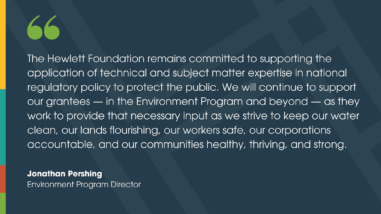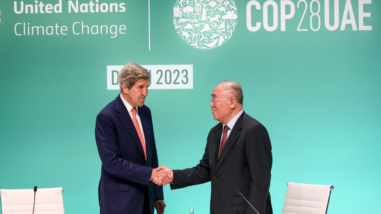Great Plains Institute for Sustainable Development
For General Operating Support
-
Amount$1,500,000
-
Program
-
Date Awarded2/15/2017
-
Term12 Months
-
Type of SupportGeneral Support/Organization
Overview
This grant will support the institute’s work, which includes researching the efficacy of scaling Carbon Capture and Storage (CCS) in key states, and creating an analytical framework to help policymakers determine if increased federal support for CCS research, development, and deployment is warranted. Most climate models — including those of the Intergovernmental Panel on Climate Change and International Energy Agency — involve CCS in meeting a 2-degree goal. The institute is collaborating with eight organizations at the state and federal levels, and working with the Department of Energy to research cleaner and more cost-effective CCS options, which countries like India and China can leverage. At the federal level, the institute will conduct research that can build the case for tax credit support of CCS.
About the Grantee
Grantee Website
www.gpisd.net
Address
2801 21st Avenue South, Suite 220, Minneapolis, MN, 55407, United States
Grants to this Grantee
for the Conveners’ Network
The Conveners’ Network, a project of the Great Plains Institute, supports state-level planning that leverages federal resources to achieve deep reductions in climate pollution. The network will support states in developing comprehensive plans funded through the EPA’s Climate Pollution Reduction Grants, which will help states unlock federal decarbonization resources. (Substrategy: U.S. National Policy)
for general operating support
The Great Plains Institute for Sustainable Development works on solutions that reduce and ultimately eliminate carbon emissions, while strengthening our communities and providing greater economic opportunity through the creation of high-paying jobs, expansion of the nation’s industrial base, and increased domestic energy independence. The institute has a solid track record convening diverse constituencies — often including interests that rarely, if ever, work together. Its ambition over the next three years is to create the system conditions necessary for the U.S. to cut its greenhouse gas emissions by at least 45% by 2030, on the path toward net-zero emissions by midcentury or sooner. (Substrategy: U.S. National Policy)
for the carbon management program
The Great Plains Institute’s carbon management program supports the deployment of carbon capture technologies at the scale and pace of deployment that climate science deems necessary to achieve midcentury decarbonization. The institute’s approach supports community engagement with a careful eye to supporting analysis and research on the potential benefits and harms at the community level. (Substrategy: U.S. National Policy)



